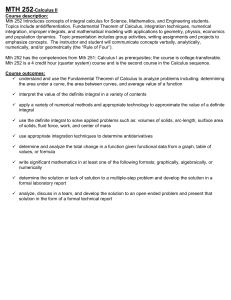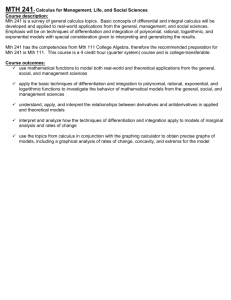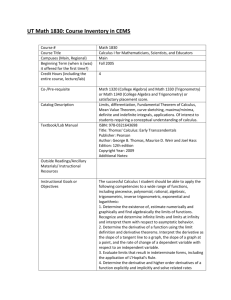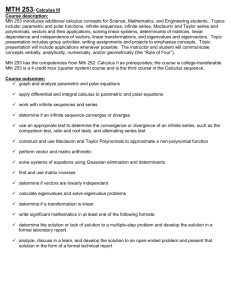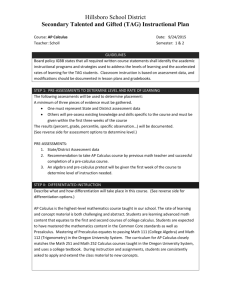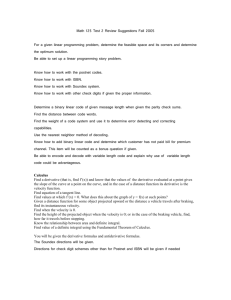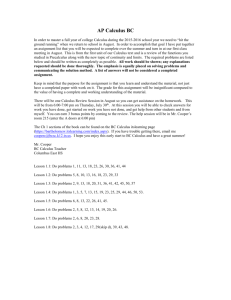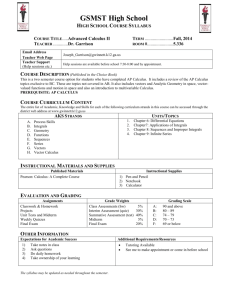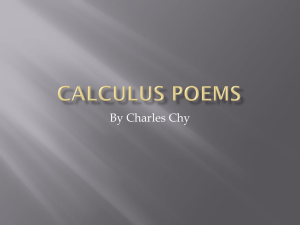Applied Calculus (MTH 270) - Course Syllabus
advertisement
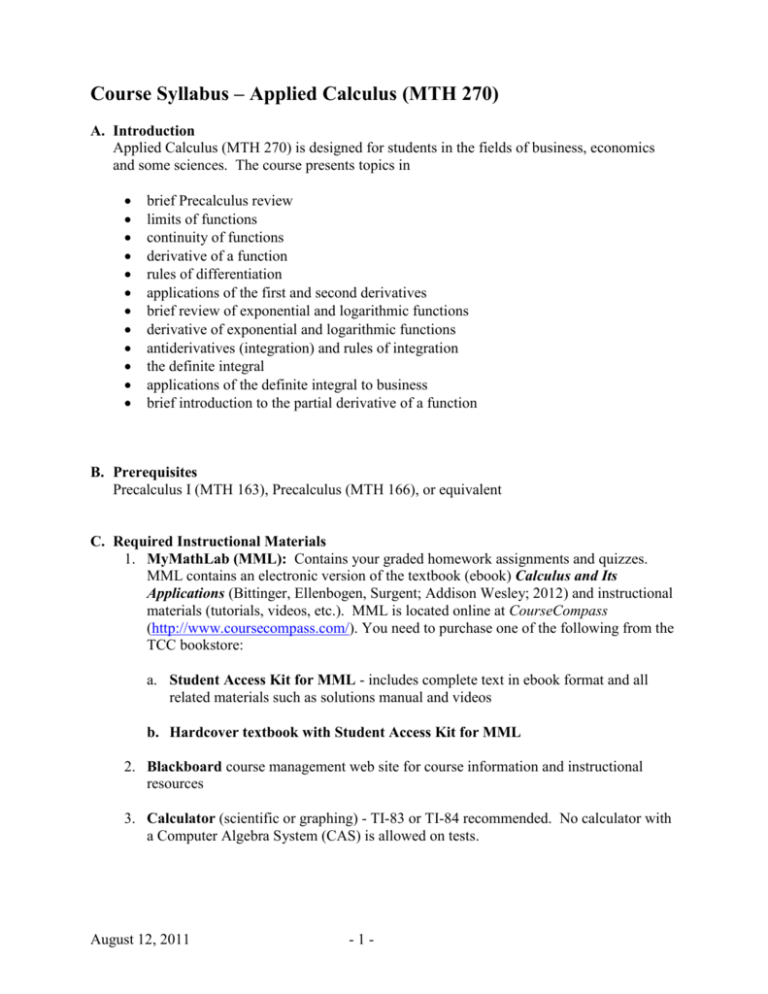
Course Syllabus – Applied Calculus (MTH 270) A. Introduction Applied Calculus (MTH 270) is designed for students in the fields of business, economics and some sciences. The course presents topics in brief Precalculus review limits of functions continuity of functions derivative of a function rules of differentiation applications of the first and second derivatives brief review of exponential and logarithmic functions derivative of exponential and logarithmic functions antiderivatives (integration) and rules of integration the definite integral applications of the definite integral to business brief introduction to the partial derivative of a function B. Prerequisites Precalculus I (MTH 163), Precalculus (MTH 166), or equivalent C. Required Instructional Materials 1. MyMathLab (MML): Contains your graded homework assignments and quizzes. MML contains an electronic version of the textbook (ebook) Calculus and Its Applications (Bittinger, Ellenbogen, Surgent; Addison Wesley; 2012) and instructional materials (tutorials, videos, etc.). MML is located online at CourseCompass (http://www.coursecompass.com/). You need to purchase one of the following from the TCC bookstore: a. Student Access Kit for MML - includes complete text in ebook format and all related materials such as solutions manual and videos b. Hardcover textbook with Student Access Kit for MML 2. Blackboard course management web site for course information and instructional resources 3. Calculator (scientific or graphing) - TI-83 or TI-84 recommended. No calculator with a Computer Algebra System (CAS) is allowed on tests. August 12, 2011 -1- Course Syllabus Applied Calculus (MTH 270) Text: Calculus and Its Applications by Bittinger, et al. D. Optional Instructional Materials Maple 15 Student Edition (Maplesoft): Students in my class can purchase Maple 15at the discounted student edition at http://www.maplesoft.com/academic/adoptioncenter/adoptioncenter_coursedetail.aspx?eid =7365. Maple is the computing software for mathematicians (including students), engineers, and scientists. E. Overall Course Objectives and Outcomes: After completion of this course, the student will be able to: 1. perform algebraic operations with equations and functions, and be able to create and interpret information from graphs of equations and functions 2. determine the limit of a function 3. formally determine whether a function is continuous or not 4. determine the derivative of a function 5. use derivatives to sketch the graph of a function 6. apply the derivative to optimization problems 7. determine the derivative of exponential and logarithmic functions 8. determine the indefinite and definite integrals of functions 9. use the definite integral to determine area 10. apply the definite integral to business problems 11. recognize equations for which the partial derivative is appropriate F. Instructional Strategies A variety of instructional strategies will be employed in addition to classroom discussion. These include, but are not limited to, online graded homework, small group activities in class, online group assignments, and Internet and other electronic resources. G. Attendance Policy I expect you to attend every class session. Mathematics is a comprehensive subject and builds on itself. You are responsible for reading the assigned sections of the textbook, preferably before the class meeting in which they are discussed, and completing assigned coursework. If you are unable to attend a session, contact me or a classmate to find out what you missed. More than 20% absence of the class sessions for the semester constitutes unsatisfactory attendance and will place you in jeopardy of being withdrawn from class. August 12, 2011 -2- Course Syllabus Applied Calculus (MTH 270) Text: Calculus and Its Applications by Bittinger, et al. H. Make-up Tests: Missed tests can only be made up if you have a valid reason for having missed the test (documentation may be required) and prior to the return of the test in class (normally at the next class meeting). I. Academic Integrity/Plagiarism/Cheating: Academic honesty is expected of all Tidewater Community College students. It is academically dishonest, for example, to misrepresent another person’s work as one’s own, to take credit for someone else’s work or ideas, to accept help on a test, to obtain advanced information on confidential test materials, or to intentionally harm another student’s chances for academic success. If you are ever in doubt, ask me. Any student who is found cheating or plagiarizing at any time will receive a grade of 0/F on that assignment and may be reported for administrative action by the college J. Disability Services Policy All students will be treated with respect to their individual needs. If you are receiving services related to a disability or medical condition, or feel you might need services, please make an appointment to talk to me. Any information about your disability or medical condition we discuss is confidential and will not be shared with anyone. For additional assistance, please contact your disability services counselor or the District Coordinator at 822-1213, and/or visit the web page at http://www.tcc.edu/students/specialized/disabilityservices/index.htm . Reasonable accommodations will be made for students with disabilities, provided that those students have registered with the Office of Disability Services. Please present me with the documentation. August 12, 2011 -3- Course Syllabus Applied Calculus (MTH 270) Text: Calculus and Its Applications by Bittinger, et al. K. Evaluation: Percentage of Course Grade Online Homework (MML) 4 Tests (Quiz Average* = bonus test grade) 15% / 20% 60% 25% / 20% 100% Final Exam * Quiz Average is the average of all quizzes made available not just those taken. Grading Scale: 90 + = A 80 - 89 = B 70 - 79 = C 60 - 69 = D 59/below = F My Philosophy of Learning and Teaching You learn best by doing, by making mistakes, correcting them and learning from them, and succeeding in the end. Simply getting answers is not what mathematics is about. Learning concepts, processes and relationships is what mathematics is about. Mathematics is a way of thinking, a way of communicating. I will emphasize that you learn concepts, processes and relationships by challenging you to think through problems. To help you develop your mathematical thinking skills, I will ask you questions more often than simply give you answers. In the study of mathematics, you are a puzzle solver, an explorer, a detective. The parts to solving a problem are either given to you or need to be brought to the problem by you from prior knowledge. Sometimes, the parts are obvious and the way is clear. Sometimes, the parts are buried more deeply and the way is longer, winding, or more subtle. It is your experience and your ability to think that allow you to put the parts of the puzzle together, to explore, to "solve the case." I look forward to working with you online during the semester. August 12, 2011 -4- Course Syllabus Applied Calculus (MTH 270) Text: Calculus and Its Applications by Bittinger, et al. Textbook Material to be Covered Chapter R: Functions, Graphs and Models Chapter 1: Differentiation Sections 1.1 - 1.8 Chapter 2: Applications of Differentiation Sections 2.1 - 2.7 Chapter 3: Exponential and Logarithmic Functions Sections 3.1 - 3.6 Chapter 4: Integration Sections 4.1 - 4.5 Chapter 5: Applications of Integration Sections 5.1 - 5.2 Chapter 6: Functions of Several Variables Sections 6.1 - 6.2 August 12, 2011 -5-

